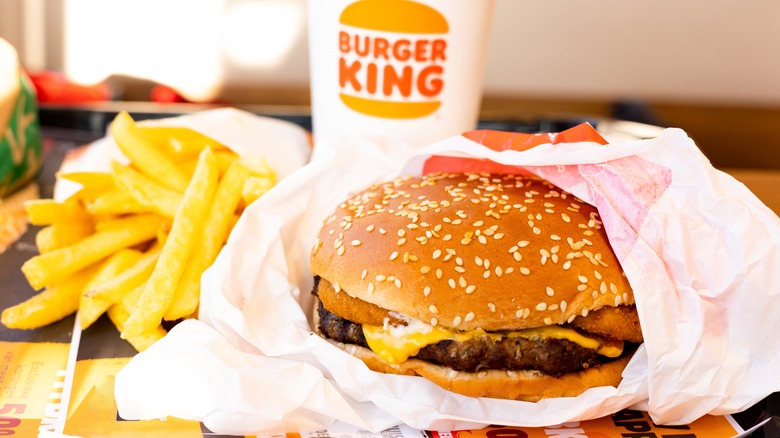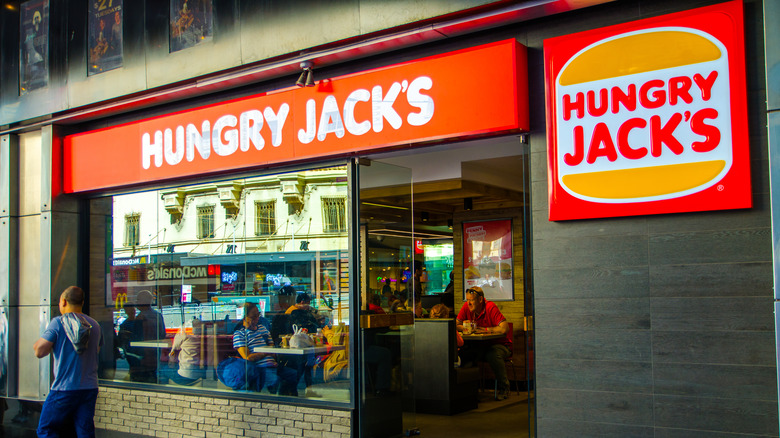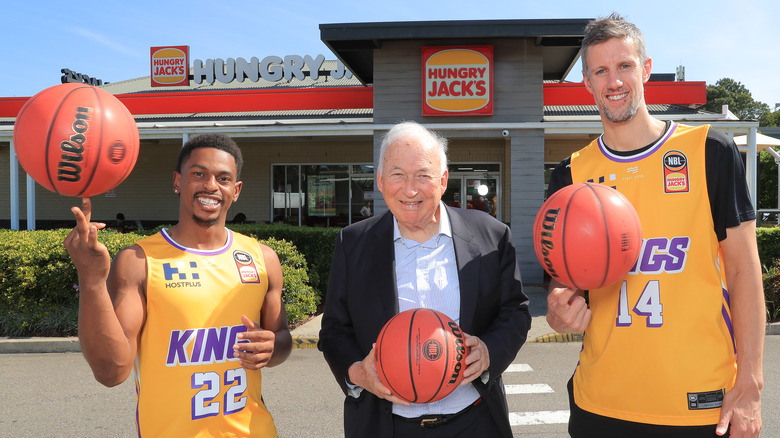Why Burger King Has A Different Name In Australia
When it comes to burger royalty in the U.S., Burger King is right at the top — surpassed only by the ever-present fast food monolith McDonald's, according to Britannica. Burger King was first called Insta-Burger King, then the restaurant was re-branded by two business partners in Florida in 1954 and franchised in 1959. Over the decades, the brand went through a handful of sales, acquisitions, mergers, and buyouts, and just as many ups and downs, notes Britannica.
With the Burger King website claiming restaurants in 73 different countries, it's clear that Burger King is a powerful brand and is a fast-food force to be reckoned with. The fact that such a large franchisor would allow just one of its international franchises to name its restaurant something different seems senseless, and yet, fans searching for a Burger King Whopper in Australia are often confused when they get sent to Hungry Jack's. The reason for Burger King's Australian name change is a remarkable story of luck, chance, and legal battles waged across oceans (via NZ Herald). One might even say it was a nod to the chain's famous slogan, "Have it your way," or in recent years, Be your own way (Burger King brought back its classic slogan with a twist in 2014).
Why did the Burger King brand call its Australian franchise something different?
In 1971, Burger King was poised to open its first restaurant in the land down under. However, the popular fast food chain (at this point owned by Pillsbury, via Britannica) discovered that an American named Don Dervan had already opened a restaurant named Burger King. Dervan had noticed that the U.S. brand hadn't yet expanded to Australia, News.au.com reports, and so he'd snapped up the Australian trademark rights to the name Burger King. The U.S. Burger King brand, not to be deterred, allowed its Australian franchisee Jack Cowin (who is, incidentally, a Canadian by birth; he moved to Australia in 1969, via Domino's Investors) to name his Australian Burger King franchise something different, according to The Sydney Morning Herald.
Cowin, perhaps with a sense of wry humor, chose a variation on the U.S. Hungry Jack brand name owned by Pillsbury (a pancake mix) and named the new Australian burger-flipping empire Hungry Jack's. The Southern Pacific fast food empire was born, and the Burger King brand was first called Hungry Jack's in Australia. As the decades passed and Australians came to love their Hungry Jack's restaurants, behind the scenes, a tense legal battle played out between the original Australian Burger King brand (owned by Dervan), the Hungry Jack's brand (owned by franchisee Cowin), and, confusingly, the franchisor, the U.S. Burger King brand (via CBC Radio).
Did Burger King eventually change the Hungry Jack's name back to Burger King?
Throughout the '70s and '80s, Cowin opened dozens of Hungry Jack's restaurants, even converting failing Wendy's restaurants into the mix (via NZ Herald). When the '90s rolled around, it was time for Cowin to renew his franchise agreement. Hungry Jack's was now the biggest international Burger King franchise. The Burger King franchisor saw Cowin's success but didn't seem pleased and took action. In 1993, the Australian Burger King trademark finally expired, and the franchisor quickly snatched it, setting out with a plan to overtake Cowin by opening some 40-odd Australian Burger King restaurants. In 1996, it tried to terminate its agreement with Cowin.
Cowin was having none of it. After decades of hard work operating Hungry Jack's in Australia and determined to see his franchise succeed, Cowin took the corporate giant to court. After an incredible legal battle, in 1999, The Australian Financial Review reported Cowin won a cool $71 million in damages and the right to continue the franchise agreement. You see, back in 1971, Burger King had agreed Cowin was the master franchisee in Australia, NZ Herald explains. Yet the franchisor — upon seeing Cowin's success — attempted to undermine their own franchisee by opening what were essentially competing restaurants. Judges found the franchisor guilty, and in 2003, the franchisor relinquished full Australian business rights to Cowin.
At this historic moment, Cowin made a decision that was purely Aussie: The Canadian-Australian kept Hungry Jack's brand name, CBC Radio says — because it was what Australian fans knew and loved.


